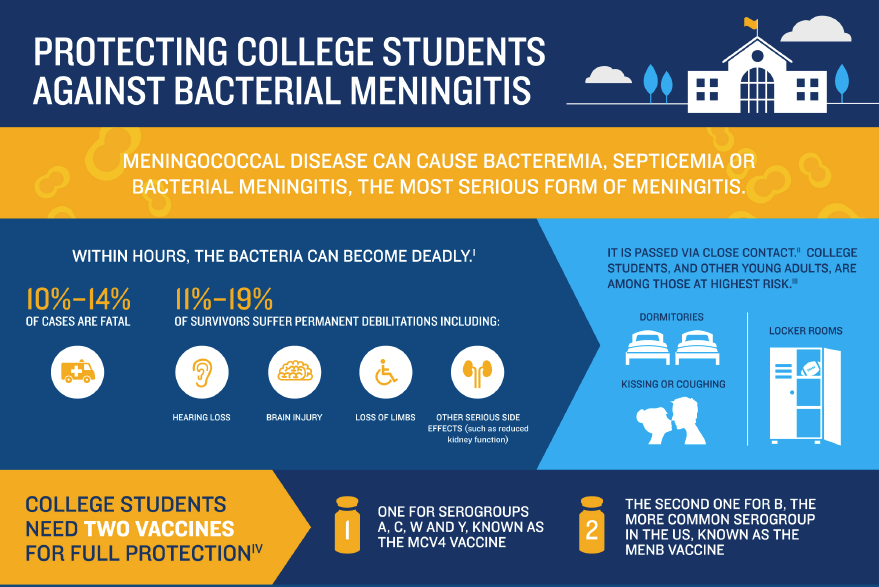Meningococcal disease is a serious illness caused by a type of bacteria called Neisseria meningitidis. It can lead to meningitis (infection of the lining of the brain and spinal cord) and infections of the blood. Meningococcal disease often occurs without warning – even among people who are otherwise healthy.

There are five subtypes (serogroups) of bacteria that cause most cases of meningococcal disease: A, B, C, W, and Y.
Symptoms normally develop within 3 to 7 days of exposure to a carrier. Symptoms of meningococcal disease can be mistaken for the flu, and they often progress rapidly. Symptoms may include fever, headache, neck and body aches, nausea and vomiting. As the disease progresses, symptoms may develop into confusion and rash. In infants, symptoms may be absent or hard to recognize.
Despite the best of medical treatments, meningococcal disease can lead to death in less than 24 hours in an otherwise healthy individual. Therefore, vaccination offers the best way to protect against meningococcal disease.
Am I at risk?
The bacteria that cause meningococcal meningitis (Neisseria meningitidi) are spread through the exchange of respiratory and throat secretions like saliva or spit (e.g. living in close quarters, kissing).
Meningococcal disease can spread from person to person through close contact or lengthy contact, especially among people living in the same household. Particularly, students living in dorms or shared apartments are at risk for contracting this disease due to close living proximity.
Infectious diseases tend to spread wherever large groups of people gather together. Recent data show that the risk for meningococcal disease in college students is slightly higher than the risk in other teens and young adults who are not attending college. CDC recommends meningococcal conjugate vaccines for first-year college students living in residence halls. If they received it before their 16th birthday, they need a booster dose for maximum protection before going to college.
College campuses have reported outbreaks of serogroup B meningococcal disease during the last several years. Meningococcal conjugate vaccines do not include protection against serogroup B meningococcal disease. CDC recommends the use of a serogroup B meningococcal vaccine for people identified to be at increased risk because of a serogroup B meningococcal disease outbreak, including outbreaks on college campuses.
How can I protect myself?
Two vaccines are needed to be fully protected against meningococcal disease. As mentioned, the first vaccine protects against serogroups A, C, W, and Y (conjugate vaccine). It is likely that you already received this vaccine prior to entering college, as it is currently listed as one of UF’s mandatory vaccination requirements. While this vaccination provides protection against several types of Meningococcal disease, it does not provide protection against Meningitis B.
The second vaccine protects against serogroup type B (MenB Vaccine).
Until late 2014, there was no vaccine able to protect against Men B. This was particularly problematic as MenB is the leading serogroup that causes meningococcal disease in infants and adolescents. This changed with the breakthrough creation of the Men B vaccine. For the first time, there is near complete coverage to protect against this devastating disease. However, many adolescents and young adults have not received the MenB vaccine since it was just recently approved.
Does UF require that I get the meningitis B vaccine?
Currently, the University of Florida is not requiring that you get the vaccine against meningococcal meningitis, but SHCC strongly recommends that any student who will be living in university (residence halls) or Greek system (fraternity or sorority) housing seriously consider being vaccinated against meningococcal meningitis.
The vaccines that protect against meningococcal disease are currently available at SHCC. Currently enrolled students can call SHCC’s Travel and Immunization Clinic at (352) 294-7472 to schedule an appointment for Men B vaccination.
Source: CDC.gov
Avnee Foundation

